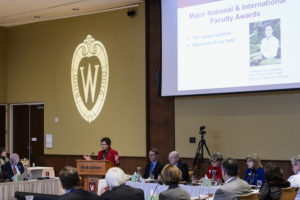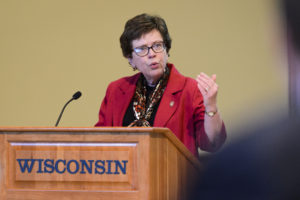MADISON – The University of Wisconsin System’s array of academic programs is well aligned to meet the workforce needs of the state, now and into the future, according to a report presented Thursday to the Board of Regents.
“Our institutions produce well-rounded individuals who contribute to our society and economy – they are informed, engaged citizens,” said UW System President Ray Cross. “As we set forth in our 2020FWD strategic framework, we are committed to preparing our graduates with critical thinking and creative problem solving skills. It is also vitally important that we provide degree programs in the UW System that are aligned with the projected highest growth occupations in Wisconsin.”
James Henderson, Vice President for Academic and Student Affairs, told Regents that 20 additional UW System degree programs were authorized in 2016, and these programs largely align with state and national demand trends, particularly in the areas of STEM (science, technology, engineering and math), healthcare and entrepreneurship fields.
- See UW System PowerPoint presentation, “UW System Academic Programs and Wisconsin’s Workforce Needs”
Regent Tim Higgins commended the presentation for putting program array into practical context.
Cross reminded Regents that while a public university cannot ignore the workforce demands of the state in which it lives, works and serves, that cannot be its only purpose as a university.
“Workforce development is important but it’s not the only thing we do,” Cross said. “We also want students to engage in self-reflection, to be better people as part of this process of engaging in the pursuit of truth. We want them to function as citizens, but additionally we want them to understand how they participate in society … and to engage effectively in the economy.”
Chancellor Blank calls for reinvestment in UW-Madison
Host Chancellor Rebecca Blank told Regents that UW-Madison has maintained a high quality in education and research, but further efforts – including new state investment and flexibilities that will allow the campus to act entrepreneurially – will be essential to securing continued excellence in the future.
“I am very encouraged by the things the Governor and legislators have been talking about in terms of reinvesting in the UW, and I’m hopeful that we can all work together to change some worrisome trends,” Blank said.
Many of the benchmarks the university watches are promising, she said, noting, for example, that a new record for applications to attend UW-Madison has been set for three years in a row. Also, the average student now completes an undergraduate degree at UW-Madison in 4.07 years, Blank said, with the six-year graduation rate for all students at 85.2 percent. Blank said the figures show the university is closing the opportunity gap.
While there is plenty of good news, some causes for concern remain, Blank said, including declining research expenditures.
“This is something we’ve got to turn around,” she said.
In addition to greater reinvestment from the state, Blank said the university needs to be more entrepreneurial in developing strategies to grow new revenue sources.
Blank also announced Thursday that UW-Madison has signed updated transfer agreement with the state’s two-year colleges and is in the process of completing agreements with several of the state’s technical colleges.
In addition, Blank said that if UW-Madison receives sufficient new investment in the 2017-19 biennial budget, she is committed to guaranteeing at least one year tuition-free for first-generation Wisconsin students who meet the requirements of a proposed new “Badger Promise” transfer program.
“This is the sort of thing we can do when we are growing revenues and reinvesting back in our university to increase its quality, affordability, and reputation,” Blank said.
Education Committee
Jim Henderson, Vice President for Academic and Student Affairs, provided an update on a recent Math Workshop at which representatives from all UW System institutions got together to look at developing better pathways for implementing the common cut score for placement into credit-bearing math classes.
Three areas were identified for attention: designing appropriate math pathways depending on a student’s intended major; placing students into credit-bearing math courses as soon as possible, even if remedial coursework is required; and determining math placements based on multiple criteria, including ACT scores, high school grades, and UW placement tests.
“This is a good example of the value of a System,” said Henderson, noting how multiple institutions can provide information and collaborate in support of students.
In other business, the Education Committee:
- Approved UW-Madison’s request for a Bachelor of Science in Education Studies. The degree responds to growing undergraduate interest in obtaining the multi-disciplinary training to address domestic and global education policy issues;
- Approved the post-tenure review policy for UW-Superior;
- Approved the new Pathways High School charter and contract, as recommended by UW-Milwaukee. A charter was granted to operate a public school known as Pathways High School for a period of five years, from July 1, 2017 until June 30, 2022;
- Approved the renewal of the 21st Century Preparatory School charter contract, as recommended by UW-Parkside. Racine Charter One, Inc., is granted a renewal charter to operate a public school known as 21st Century Preparatory School for five years, effective Jan. 20, 2017 until Jan. 19, 2022; and
- Heard a presentation from UW-Madison Provost Sarah Mangelsdorf on educational issues at the university. The presentation included information on graduation rates and how they compare with peer institutions.
Business and Finance Committee
In the first of two statutorily required Information Technology reports, the Committee received an overview regarding UW System Strategic Plans for major IT projects. In the coming year, the work of the Information Technology community will continue to emphasize strategy and information security. The Committee also heard a report on the status of four large IT projects underway in the UW System, including the UW System Oracle/PeopleSoft Human Capital Management Application upgrade; UW-Stevens Point’s implementation of Oracle/PeopleSoft Campus Solutions; replacement of the UW System Interactive Reporting Tool; and a new UW System Budget, Planning, and Forecasting System.
In other business, the Business and Finance Committee:
- Approved the inaugural Charter for its new Subcommittee on Investments. The Charter outlines specific responsibilities of the subcommittee in overseeing the management and administration of funds invested on behalf of the Board of Regents;
- Heard a summary report on Quarterly Gifts, Grants and Contracts for the period July 1, 2016 through December 31, 2016. Total awards for the period were approximately $753.6 million, a decrease of $17.5 million compared to the prior year. Federal awards decreased $38.1 million while non-federal awards increased by $20.6 million;
- Received a high-level summary report comparing budgeted to actual revenues and expenditures through the second quarter of fiscal year 2017. This mid-year, cash-based management report shows that as of December 31, 2016, actual expenditures were approximately 45.0% of the Regent-approved budget, while revenues were at 49.7% of the budgeted level;
- Approved an exception to Board policy that requires non-endowed gifts or bequests in excess of $1 million to become Board-designated endowments. UW-Madison Chancellor Blank had requested the exception for a bequest from the Louis and Annette Kaufman Trust, and sought to allow expenditure of the full amount of the bequest which is currently estimated to be approximately $3.4 million. The institution intends to use the funding to expand its Educational Innovation Initiative and support parts of the new Hamel Music Center project; and
- Approved a request from UW-Madison for a salary range exceeding 75% of the UW System President’s salary. This will allow UW-Madison to recruit for a new Dean of the School of Business at a salary of up to $475,000.
Capital Planning and Budget Committee
The Capital Planning and Budget Committee approved UW System’s request for the Criteria for Ranking Building Projects, which are used as the basis for prioritizing major capital projects for inclusion in UW System capital budget requests. The intended use of the criteria is to create a priority list of projects that address the greatest needs, highest academic priorities, and most cost-effective solutions to established facility deficiencies.
In other business, the Capital Planning and Budget Committee:
- Approved UW System’s request for the UW-Madison Health Science Library Center Academic Affairs Curriculum Enhancement project, which is entirely funded by approximately $16 million in Gift Funds. This project renovates space in the Health Science and Learning Center to enhance the teaching, administrative, and public space for Academic Affairs; improves the mechanical system; and provides security enhancements, all to support a new medical education curriculum and prepare for an accreditation evaluation;
- Approved UW System’s request for approval of the UW-Madison School of Business Learning Commons project, which is entirely funded by approximately $10 million in Gift Funds. This project will renovate space across three floors of library, classroom, and computer lab space within Grainger Hall, improve the mechanical system, and provide audio visual equipment to support flexible active learning classrooms; and
- Heard a presentation from host UW-Madison, “Extending Our History, Embracing Our Future,” providing an overview of the Campus Master Plan.
Research, Economic Development, and Innovation Committee
UW-Madison Vice Chancellor for Research and Graduate Education Marsha Mailick told Regents that the decline in state support in recent years has played a significant role in UW-Madison’s drop, for the first time since 1972, from the National Science Foundation’s top five universities nationally in research expenditures.
Mailick said strategies to do that include: increasing faculty size in high-impact fields; targeting units in clinical research data, science, and others; reducing over-regulation in research compliance; and modernizing research laboratories and facilities.
Regent Eve Hall, REDI committee chair, added that the UW must continue to pursue innovative public-private opportunities in addition to advocating for state and federal support.
In other business, the REDI Committee:
- Heard a report from System Vice President for Academic and Student Affairs James Henderson on UW System initiatives to support collaborative research, community engagement, and faculty and student involvement across common areas of interest to the state.
- Heard a presentation from UW-River Falls Chancellor Dean Van Galen on UW-River Falls and its support of the agriculture industry in Wisconsin through engaged learning and regional and global partnerships. Van Galen was joined by Dale J. Gallenberg, Dean of the College of Agriculture, Food, and Environmental Sciences, and Jennifer Lu, Economic Development Consultant with the Wisconsin International Agribusiness Center/DATCP.
Audit Committee
Chief Audit Executive Lori Stortz and audit directors provided the Audit Committee with a high-level report on recently issued reports related to cash handling, purchasing cards, NCAA compliance, international education, and emergency preparedness.
In other business, the Audit Committee:
- Heard a report on the Fiscal 2017 audit plan progress;
- Heard a progress report from Director Amanda Nehmer on resolving comments and implementing recommendations included in audit reports.
The next meeting of the UW System Board of Regents is at 9 a.m., February 3, 2017, at Union South, UW-Madison.


